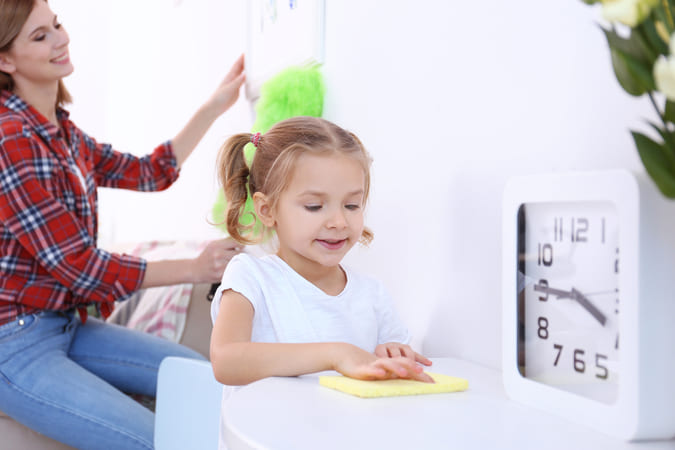Parenting
Democratic Parenting: A Modern Guide to Raising Empowered Kids

Democratic parenting is a style that emphasizes collaboration, respect, and mutual decision-making between parents and their children. This approach strikes a balance between independence and boundaries while also considering the well-being of the entire family.
In this blog post, we delve into the world of democratic parenting styles and explore how this empowering parenting style can shape children into responsible, independent, and emotionally grounded adults.
Key Takeaways:
- Parenting in a democratic style fosters a sense of teamwork, mutual respect, and shared decision-making within family units.
- This style balances independence, boundaries, and care for the whole family’s well-being.
- Democratic parenting approach aims to nurture adults who are responsible, self-reliant, and emotionally balanced.
Understanding Democratic Parenting
In families that embrace a democratic approach, each member has the opportunity to contribute their perspective to family decisions. This practice cultivates feelings of independence, accountability, and collaboration among children. It encourages parents to listen to their children’s thoughts and ideas rather than dictating their actions.
Through open communication and shared decision-making, democratic parenting aims to raise responsible, independent, and emotionally grounded adults.
What is democratic parenting?
Democratic parenting is a parenting style that fosters autonomy, responsibility, and a sense of democracy within a family.
In this approach, parents and children work together in decision-making. Additionally, in a democratic parenting environment, parents are consistently enforcing boundaries and ensuring that children understand the consequences of their actions.
All members of the family are treated as equals and have a voice when it comes to making decisions that affect their lives. This parenting approach encourages children to have a sense of independence while also considering the well-being of the entire family.
Paradigm
Paradigm refers to the set of beliefs, values, and practices that shape how parents approach raising their children. This approach involves giving children a voice and a say in decisions that affect them, while still providing the necessary guidance and rules. The democratic parenting paradigm emphasizes on:
- Mutual respect
- Open communication
- Collaboration between parents and children
Intrinsic Motivation
As well as that, democratic parenting aims to cultivate intrinsic motivation in children. By treating them with respect and dignity, parents can foster a sense of empowerment and empathy among their children. This allows children to develop a strong sense of self and inner motivation, as they are given choices and held accountable for their own decisions.
Providing opportunities for children to make choices and be involved in family decisions helps them:
- Learn the benefits of collaboration and communication
- Build trust and a sense of responsibility
- Develop problem-solving and decision-making skills
- Understand the importance of considering the needs of others
Democratic vs Other Parenting Styles
Authoritarian Parenting
In the authoritarian parenting style, parents set strict rules and high expectations for their kids. Authoritarian parents tend to prioritize discipline over autonomy, often using punishments as a means to control behavior. Additionally, an authoritarian parent may cause children to develop resentment and power struggles within the family.
Permissive Parenting
Permissive parenting style, on the other hand, is characterized by low expectations and minimal rules. In this casual approach, parents are more like friends to their children, allowing a greater sense of freedom. However, the lack of boundaries may lead to difficulties with self-discipline and decision-making for the child.
Authoritative Parenting
Finally, the authoritative parenting style is more of a balanced approach. Parents who use this positive parenting style set high expectations but also provide support, warmth, and encouragement. This approach fosters a sense of autonomy and responsibility in children, without the negative aspects of power struggles found in authoritarian parenting.
Authoritative parenting involves:
- Clear rules
- Consistency
- Open communication
In comparison, democratic parenting emphasizes mutual respect, autonomy, and joint decision-making within the family. Parents and children work together, with everyone having a voice in the decision-making process.
Rules and Discipline
Democratic parenting balances control and discipline with warmth, understanding, and receptive communication. In this approach, parents set rules for their children while also allowing them to learn from natural consequences and develop autonomy.
Natural Consequences
Parents let their children experience the results of their actions, helping them understand the consequences of their behavior in a real-life context. The crucial point is that parents are there to offer support and guidance but allow children to learn valuable lessons from their mistakes.
For example, this could be as simple as letting a kid feel cold when they refuse to wear a jacket or discovering that they can’t find their favorite toy after not putting it away.
Curfew
Curfew helps children learn time management and responsibility while providing them with a sense of security and boundaries. Democratic parents might involve their children in setting the curfew, giving them a say in the decision and creating an atmosphere of mutual respect.
For instance, parents and children can discuss and agree on specific times for returning home based on their age, responsibilities, and safety considerations.
KinVibes Pro-Tip: Establishing rules, using natural consequences, and setting curfews are just a few ways parents can guide their children toward a resilient, responsible, and autonomous future.
Communication and Decision-Making

Active Listening
Parents should pay attention to their children’s thoughts and feelings, responding empathetically and without judgment. Active listening helps build a trusting and supportive environment, encouraging children to express themselves honestly.
Negotiation
Negotiation is another key aspect of democratic parenting. Parents and children collaborate to find solutions that respect everyone’s needs and opinions. As a result, it teaches children on how to compromise and find win-win situations, fostering a sense of fairness and cooperation in the family dynamics.
Dialogue
The openness of democratic parenting relies heavily on dialogue, which is a two-way exchange of ideas and opinions. This communication style promotes critical thinking and reflection in children, empowering them to take an active role in decision-making.
Parents should engage in regular conversations with their children, discussing topics such as:
- Values
- Expectations
- Family rules
Promoting Respect and Love

Empathy
One of the key aspects of democratic parenting is empathy, an essential component in fostering love and mutual respect within the democratic household.
Parents who practice democratic parenting strive to understand their children’s perspectives, emotions, and experiences. This helps in creating a supportive environment where everyone’s feelings are valued.
By modeling empathy, parents teach their children to be:
- Compassionate
- Relatable
- Emotionally intelligent individuals
Trust
Another crucial element of democratic parenting is trust. Establishing trust between authoritative parents and children is essential in promoting respect and dignity among family members. Children can feel that their opinions and choices are respected, and they develop a sense of autonomy and responsibility.
In democratic parenting, parents and children learn to trust each other’s judgment and decisions, leading to a healthy and harmonious family dynamic. This allows children to grow up feeling confident and supported, knowing they are part of a loving and respectful family where their voice matters.
Parents can cultivate trust among their children by being:
- Dependable
- Reliable
- Consistent in their actions and decisions
Encouragement and Motivation

Self-Esteem
By treating kids with respect and dignity, parents help create a positive self-concept in the child. This includes acknowledging their feelings, listening to their opinions, and valuing their contributions to family decisions.
In addition to that, parents tend to offer support and reassurance, making their children feel capable and confident. They also make an effort to provide constructive feedback, focusing on the strengths and efforts of the child rather than simply emphasizing their shortcomings.
Motivation
Another key aspect of democratic parenting is helping children develop motivation. This is when kids pursue activities or goals for their own sake, driven by personal interest and self-confidence.
Parents can encourage this by providing choices and opportunities for their children to explore their interests and passions. They also avoid using excessive rewards or punishments as a means for controlling behavior, allowing the child to focus on the inherent value of the activity.
Some ways to foster motivation include:
- Encouraging curiosity and rewarding effort
- Providing a supportive environment for creativity and exploration
- Helping children establish realistic goals and develop problem-solving skills
Overall, this lays a strong foundation for the child to thrive as they grow, becoming responsible and competent adults.
Democratic Parenting in Action

Allowing children to engage in decision-making processes empowers them to develop autonomy and sharpens their ability to make informed choices. This type of parenting embraces collaboration, choice, and responsibility while maintaining a casual, respectful atmosphere.
Family Meetings
Family meetings are a fundamental aspect of democratic parenting. They involve regular get-togethers where every member of the family, including children, has an opportunity to voice their opinions and concerns. These gatherings promote collaboration and understanding among family members, helping each person to feel valued and heard. Topics for discussion might include:
- Household rules and expectations
- Upcoming events or plans
- Problem-solving for any family conflicts
Good To Know: Active listening and empathy are crucial during these meetings, as they encourage respectful communication and foster decision-making skills.
Responsibility
In the democratic model of parenting, responsibility is shared by both children and parents. This approach encourages children to make choices and take ownership of their actions by giving them the freedom to decide.
For example, parents might involve their children in:
- Planning and preparing meals
- Deciding rules and consequences for specific behaviors
- Organizing their bedroom or play area
Considerations and Drawbacks
Disadvantages
Democratic parenting, while fostering positive communication and decision-making skills, has its drawbacks. In these cases, the democratic parenting style may lead to poor decision-making and negative outcomes.
Time-Consuming: Giving a child the autonomy to make decisions may lead to lengthy conversations and require a lot of patience.
Finding The Right Balance: Some parents may struggle to find the right balance between being supportive and allowing their child too much freedom, which could result in inconsistencies and confusion about expectations.
Limited Experience: Another potential issue arises when children cannot understand the consequences of their choices due to their limited experience.
Mental Health Issues
Parents need to recognize their child’s unique needs and consider alternative parenting styles if necessary.
Although democratic parenting generally promotes positive mental health, it may not work well for all children. Some kids may have difficulties processing complex decision-making or struggle with anxiety, which can be exacerbated if they are given too much responsibility.
Democratic Parenting Educational Theories
There are several parent education theories based on democratic values. Two prominent ones are the Adlerian model and the Parent Effectiveness Training (PET) model. Let’s examine each one.
Adlerian Model
The Adlerian model of parent education is founded on the principles of Alfred Adler, a psychologist who advocated for the democratic style of parenting. This theory emphasizes the significance of instilling values such as cooperation, respect, and social interest in children’s behavior.
Parents who follow this theory are encouraged to involve their kids in decision-making and share power within the family. Moreover, this promotes an atmosphere of trust and open communication, allowing children to develop crucial life skills and problem-solving abilities.
Parent Effectiveness Training (PET) Model:
On the other hand, the Parent Effectiveness Training (PET) model is a program developed by Dr. Thomas Gordon. The PET model shares similarities with the Adlerian model in terms of promoting mutual respect, equality, and personal freedom.
However, it differs by providing specific techniques to help parents communicate effectively with their children. Parents who adopt the PET model aim to establish an atmosphere of collaboration and harmony, rather than relying on a hierarchy of power. Some of these techniques include:
- Active listening
- Problem ownership
- Conflict resolution
Which Parent Theory is better?
The choice between the Adlerian model and the Parent Effectiveness Training (PET) model depends on the parents’ needs. The Adlerian model is ideal for those seeking a value-driven approach that includes children in decision-making. In contrast, the PET model provides practical communication tools like active listening and conflict resolution.
Let’s examine and compare the table below.
| Theory | Description | Key Components | Benefits | Disadvantages |
|---|---|---|---|---|
| Adlerian Model | Focuses on mutual respect and cooperation between parents and children. | Democratic family meetings, positive discipline, encouragement. | Promotes a cooperative family environment, builds mutual respect, and develops social interest. | Can be challenging to implement consistently, may not address specific behavioral issues. |
| Parent Effectiveness Training (PET) Model | Democratic family meetings, positive discipline, and encouragement. | Active listening, I-messages, conflict resolution. | Improves communication, enhances problem-solving skills, fosters a harmonious family environment. | Can be time-consuming, may not work well in all family dynamics, requires commitment from all family members |
Above all, both democratic parenting education theories share a common objective: nurturing a healthy, cooperative relationship between parents and children.
The Role of Democratic Values

In democratic families, parents work with their children to foster connection and develop rules and responsibilities together. As children grow up in this nurturing atmosphere, they are more likely to develop a genuine appreciation for democratic values.
Democratic parenting revolves around the core values of:
Freedom: They learn the significance of freedom – not only as an individual right but also concerning others. It teaches them to express their opinions openly while still listening to and respecting the views of their family members.
Equality: This is where parents show the same level of respect to their children as they expect in return. This mutual understanding encourages children to see themselves as equals, reducing the chances of them developing an inflated sense of entitlement or disrespect towards others.
Mutual respect: It focuses on allowing children to have a certain level of autonomy in decision-making while maintaining a loving and supportive environment.
FINAL THOUGHTS – LEAVE A POSITIVE IMPACT THROUGH DEMOCRATIC PARENTING
Above all, democratic parenting is a valuable approach that fosters a harmonious balance between parental guidance and child autonomy, creating a nurturing environment where strong connections flourish, and every family member’s voice is valued and respected. Embracing this parenting style involves adopting key strategies that enhance the parent-child relationship and contribute to the successful implementation of democratic principles in everyday family life.
Parents, serving as the primary role models, have the profound responsibility of embodying values such as empathy, cooperation, and resilience. In doing so, they set the stage for their children to emerge as responsible, well-rounded adults, fully equipped to navigate the complexities of life with grace and confidence, leaving a positive impact on their communities and society at large.
Frequently Asked Questions
What are the key features of democratic parenting?
Democratic parenting is characterized by joint decision-making, mutual respect, autonomy, and responsibility. It focuses on clear rules, explains to the children, and encourages their understanding of boundaries.
How does democratic parenting differ from other styles?
Unlike authoritarian parenting, which relies on strict rules and punishments, or permissive parenting, democratic parenting emphasizes dialogue and reflection, promotes understanding of rules and values, and adjusts boundaries according to specific situations.
What are some benefits of using the democratic parenting style?
Democratic parenting fosters a sense of responsibility, self-regulation, decision-making, confidence, and self-esteem in children. It focuses on clear rules, explains to the children, and encourages their understanding of boundaries.
Can you provide examples of democratic parenting in media?
Some TV shows and movies portray families where parents and children engage in open communication and mutual decision-making.
What are The potential drawbacks of democratic parenting?
Some potential pitfalls of democratic parenting include misinterpretation of flexibility as a lack of structure or becoming overly indulgent permissive parents. Additionally, finding the right balance between being assertive and flexible can be challenging.
How can I implement democratic parenting techniques in my family?
To implement democratic parenting techniques, start by involving your children in decision-making processes and establish clear rules with them. Discuss the importance of these rules and be open to adjusting them as needed. You can also encourage open communication, critical thinking, and mutual respect.
If you’re interested in exploring how different parenting approaches influence the futures of our children, I recommend reading my article, “How Various Styles Shape Our Children’s Futures.” This piece provides a comprehensive overview of various parenting styles and their potential long-term effects, offering a broader understanding of the choices we make as caregivers.
